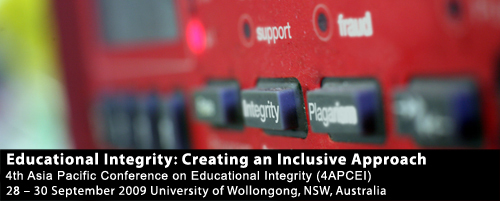Location
41.104
Start Date
29-9-2009 4:00 PM
End Date
29-9-2009 4:30 PM
Description
This paper addresses the continuing problem of plagiarism which, as a form of academic misconduct, has plagued pedagogy for generations. Little has changed in the way students employ the various methods of plagiarism, until now. Traditionally detection technologies have kept pace with the technologies students use to cheat. However, the technologies students can harness to assist them in plagiarising have now leapt forward another generation, making the detection of plagiarism very difficult to detect. Further, it seems unlikely that technology can advance to a state sufficient to bridge the gap. This new method of plagiarism utilises the intercultural technique of back-translation. This is where a passage of text is taken, verbatim, and translated to a foreign language, French for instance. It is then re-translated back into English using the same technique. Through a discussion of how students use translation technologies to change and conceal their copied text, the paper exposes back-translation as a method of plagiarising and concealing it. The paper concludes with a discussion on methods that teachers could adopt for reducing the potential of back-translation misuse. These methods include: use of current materials, writing up in class, and tighter control over resources.
Back-translation: the latest form of plagiarism
41.104
This paper addresses the continuing problem of plagiarism which, as a form of academic misconduct, has plagued pedagogy for generations. Little has changed in the way students employ the various methods of plagiarism, until now. Traditionally detection technologies have kept pace with the technologies students use to cheat. However, the technologies students can harness to assist them in plagiarising have now leapt forward another generation, making the detection of plagiarism very difficult to detect. Further, it seems unlikely that technology can advance to a state sufficient to bridge the gap. This new method of plagiarism utilises the intercultural technique of back-translation. This is where a passage of text is taken, verbatim, and translated to a foreign language, French for instance. It is then re-translated back into English using the same technique. Through a discussion of how students use translation technologies to change and conceal their copied text, the paper exposes back-translation as a method of plagiarising and concealing it. The paper concludes with a discussion on methods that teachers could adopt for reducing the potential of back-translation misuse. These methods include: use of current materials, writing up in class, and tighter control over resources.


